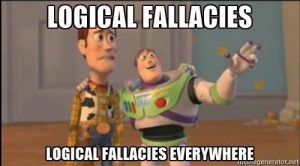Aug
10
2017
 Understanding the nature of argument and specific logical fallacies is a cornerstone of critical thinking. I was therefore surprised when I read an article by a philosopher, Maarten Boudry, titled: “The Fallacy Fork: Why It’s Time to Get Rid of Fallacy Theory.”
Understanding the nature of argument and specific logical fallacies is a cornerstone of critical thinking. I was therefore surprised when I read an article by a philosopher, Maarten Boudry, titled: “The Fallacy Fork: Why It’s Time to Get Rid of Fallacy Theory.”
Boudry lays out what he feels is a critical weakness in using the notion of logical fallacies to police sloppy thinking and his solution is to abandon the notion of informal logical fallacies altogether. I strongly disagree, and ironically I think Boudry is committing a couple logical fallacies in his argument.
The Fallacy Fork
The basis of his position is the notion of what he and his coauthors on a 2015 paper call “The Fallacy Fork.” The basic idea is that informal logical fallacies are highly context dependent. Let’s take as an example the fallacy of confusing correlation with causation. Because this reasoning is context dependent there is a spectrum in terms of how absolutely one makes this argument.
So, someone might say that correlation is always due to direct causation, which is clearly not true. They might also take the position that one particular causation must be true because of a correlation, which again is demonstrably false. There is no legitimate “always” or “must” with such arguments.
Continue Reading »
Aug
07
2017
I was interviewed a few months ago by a journalist, John Blake, doing a piece on exorcism. That article has now been published, and I’m afraid it’s disappointing in all the predictable ways.
The article is mostly about Dr. Richard Gallagher, a Yale-trained psychiatrist who believes in demonic possession. Gallagher is like catnip to a journalist – someone with credentials who has a fantastical story to tell. Is demonic possession real? This Yale psychiatrist says, “Yes.”
I have already deconstructed Gallagher’s claims, and the CNN article provides nothing new. Gallagher’s evidence that some people are actually possessed is predictably thin and proves only his lack of critical thinking. He cites the claim that possessed people display hidden knowledge, but his examples are far more easily explained as cold reading. He cites displays of extraordinary strength, which is not unusual for ordinary people under the influence of adrenaline.
He also cites hearsay – other people have told him they saw levitation, although he never witnessed it himself.
Continue Reading »
Aug
04
2017
 Do you want to get rich on the internet? Here is a simple formula. First, purge yourself of any ethics or scruples you may have. Suppress any urge for intellectual honesty.
Do you want to get rich on the internet? Here is a simple formula. First, purge yourself of any ethics or scruples you may have. Suppress any urge for intellectual honesty.
Next, pretend you are an expert. Actual expertise is not necessary. In fact, you don’t even need a basic 5th grade level of knowledge. There are titles you can grant yourself to easily accomplish this step: life coach, nutritionist, health ranger, food chick, whatever.
Now you are almost there. All you have to do is create a demand for some useless snake oil that you can sell online for a ridiculous markup. At this point you might be thinking – why would anyone buy my useless snake oil? It’s actually a lot easier than you think, and marketers have been using some version of this strategy since the barter system was invented. In a word – fear.
Just make your marks (I mean customers) afraid of something and then sell them the solution. It’s easier than you might think, everything you need is already on the internet. Recently John Oliver showed how Alex Jones uses crazy conspiracy theories to stoke fear and rage in his audience then sell them water filters and supplements as a solution. He is also selling a conspiracy culture and convinces his gullible audience that they need to support him so that he can get the truth out there. Jones can even admit it’s all an act and it doesn’t matter, because he successfully created an environment in which facts and truth are whatever he says they are – a marketer’s dream.
Continue Reading »
Aug
03
2017
 If I gave you a string of digits to remember, how many do you think you could handle? For example, try to remember the number – 8945557302. That’s 10 digits. Most people can handle only 7, and there is a specific neurological reason for this. Our working memory is wired for about 7 bits of information (give or take 1-2 bits). Now, try to remember the number as 894-555-7302. That is recognizable as a phone number, and despite the fact that the individual digits exceed our bit capacity, most people can remember such numbers.
If I gave you a string of digits to remember, how many do you think you could handle? For example, try to remember the number – 8945557302. That’s 10 digits. Most people can handle only 7, and there is a specific neurological reason for this. Our working memory is wired for about 7 bits of information (give or take 1-2 bits). Now, try to remember the number as 894-555-7302. That is recognizable as a phone number, and despite the fact that the individual digits exceed our bit capacity, most people can remember such numbers.
Grouping bits of information into recognizable patterns in order to make them easier to remember is a phenomenon called chunking, first described by George Miller in his 1956 book, The Magical Number Seven, Plus or Minus Two: Some Limits on our Capacity for Processing Information.
Chunking is best established as a mnemonic device. Miller and others conducted experiments to see how much chunking as a strategy could extend the limits of human memory. For example, the typical number of binary bits, such as Morse code, people can remember is 9. However, someone who understands morse code will chunk the individual bits into groupings of three, each one representing a letter. They will then group letters into words and words into sentences. This type of chunking extended memory from 9 to 40 binary bits.
Another study involved a runner tasked to remember strings of digits, again starting with a typical digit span of 7. However, he was encouraged to chunk the digits into race times – a meaningful pattern with which he was very familiar. With a little practice he increased his digit span to 80 numbers.
Continue Reading »
Aug
01
2017
 On a recent post I repeated my long challenge to name any alternative medicine treatment that has been rejected by CAM proponents because of evidence of lack of efficacy. I am not aware of any. It doesn’t seem to ever happen – because alternative medicine is disconnected from evidence and reality.
On a recent post I repeated my long challenge to name any alternative medicine treatment that has been rejected by CAM proponents because of evidence of lack of efficacy. I am not aware of any. It doesn’t seem to ever happen – because alternative medicine is disconnected from evidence and reality.
As if to make my point, I came across this article on Buzzfeed about laetrile – yeah, laetrile. For those of you old enough to remember, laetrile is a fake cancer cure that was already being made fun of on Saturday Night Live in the 1970s (the original cast). I haven’t heard of this one for a while, but apparently it is making a comeback.
The story of laetrile, in addition to demonstrating yet again that snake oil peddlers are con artists, also showcases how the world has changed in the last forty years when it comes to health fraud (hint – not for the better). Continue Reading »
 Understanding the nature of argument and specific logical fallacies is a cornerstone of critical thinking. I was therefore surprised when I read an article by a philosopher, Maarten Boudry, titled: “The Fallacy Fork: Why It’s Time to Get Rid of Fallacy Theory.”
Understanding the nature of argument and specific logical fallacies is a cornerstone of critical thinking. I was therefore surprised when I read an article by a philosopher, Maarten Boudry, titled: “The Fallacy Fork: Why It’s Time to Get Rid of Fallacy Theory.”
 Do you want to get rich on the internet? Here is a simple formula. First, purge yourself of any ethics or scruples you may have. Suppress any urge for intellectual honesty.
Do you want to get rich on the internet? Here is a simple formula. First, purge yourself of any ethics or scruples you may have. Suppress any urge for intellectual honesty. If I gave you a string of digits to remember, how many do you think you could handle? For example, try to remember the number – 8945557302. That’s 10 digits. Most people can handle only 7, and there is a specific neurological reason for this. Our working memory is wired for about 7 bits of information (give or take 1-2 bits). Now, try to remember the number as 894-555-7302. That is recognizable as a phone number, and despite the fact that the individual digits exceed our bit capacity, most people can remember such numbers.
If I gave you a string of digits to remember, how many do you think you could handle? For example, try to remember the number – 8945557302. That’s 10 digits. Most people can handle only 7, and there is a specific neurological reason for this. Our working memory is wired for about 7 bits of information (give or take 1-2 bits). Now, try to remember the number as 894-555-7302. That is recognizable as a phone number, and despite the fact that the individual digits exceed our bit capacity, most people can remember such numbers. On a recent post I repeated my long challenge to name any alternative medicine treatment that has been rejected by CAM proponents because of evidence of lack of efficacy. I am not aware of any. It doesn’t seem to ever happen – because alternative medicine is disconnected from evidence and reality.
On a recent post I repeated my long challenge to name any alternative medicine treatment that has been rejected by CAM proponents because of evidence of lack of efficacy. I am not aware of any. It doesn’t seem to ever happen – because alternative medicine is disconnected from evidence and reality.




